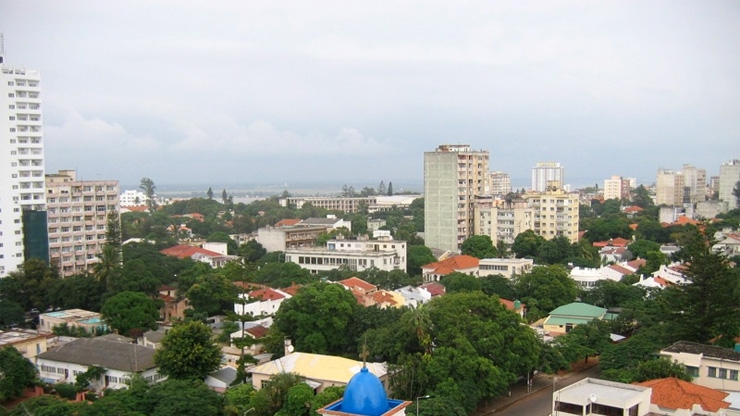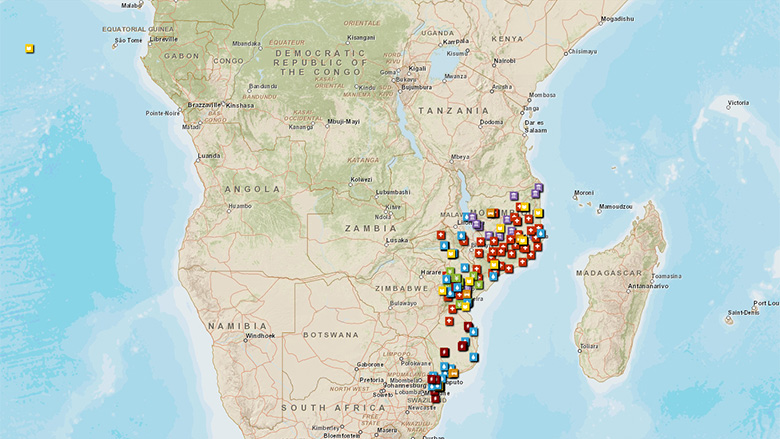Challenge
The deceleration of poverty reduction in the face of robust economic growth is the defining development challenge in today’s Mozambique. The challenge is to diversify the sources of economic growth; integrate capital-intensive mega-projects with the government’s poverty reduction strategy; and develop the agriculture sector which employs close to 80% of the workforce but remains largely unproductive and subsistence-based. More broadly, Mozambique needs to improve provision of public goods to facilitate inclusive growth (e.g., infrastructure, education, health); set up well-targeted safety nets for the most vulnerable; promote greater voice and citizen participation while building transparent and accountable systems, and, lastly but not least accelerate investment climate reforms. The scale of Mozambique’s challenges is enormous. The World Bank’s Doing Business Report 2013 has Mozambique sliding from 139th place to 146th among the 185 economies ranked.
Solution
World Bank approved a development partnership strategy for Mozambique in 2012, prepared in close collaboration with the government, development partners, and civil society and aimed at ensuring medium to long term sustainable and inclusive growth. It has three pillars:
- Competitiveness and Employment - In view of structural issues, and growth and poverty trends, the Bank looks to help improve the regulatory environment; prioritize investments through spatial planning; enhance agricultural productivity and employment in potential growth sectors; improve provision of transport, water, energy, and other infrastructure; and promote an educated, skilled, and healthy workforce.
- Vulnerability and Resilience - Given the country’s susceptibility to idiosyncratic and exogenous shocks, the Bank aims to help improve health services for the vulnerable, strengthen social protection, and encourage climate change adaptation and reduce vulnerability to natural disasters.
- Governance and Public Sector Capacity – Key to achieving the country’s development objectives is improved public financial management, particularly at the sector and local levels, as well as improved citizen participation in service delivery monitoring, improved capacity to manage renewable and non-renewable natural resources.
Results
The strategy is implementing activities that support sustainable and inclusive growth through rural and agriculture development. For instance, the IDA-funded Market Led Smallholder Development Project aims to increase the incomes of smallholder farmers in selected districts of the Zambezi Valley Region in central Mozambique through direct support to smallholder groups and other supply chain participants, and also through the strengthening of local level capacity to undertake and manage agricultural services delivery within the context of the government’s decentralization policy. The number of Community-based Organizations (CBOs) exposed to agricultural technology innovations demonstrated through the extension services surged to 440 across the five target districts in the regions mentioned above.
More than 400 networks of Community Facilitators were established to disseminate technologies among smallholder farmers including through on-farm demonstrations. To date more than 1,000 proposals for grant funding were submitted by CBOs, individuals and district administrations to benefit from the project’s financing. The project also provided funding for micro-projects including rehabilitation of feeder roads, small bridges, livestock treatment facilities, productive assets, community-based nurseries, household silos for grain storage, maize mills, and honey production in an environmentally-friendly fashion. Some of early impacts of this ongoing project is that most household farmers are investing in crop diversification including into those with access to markets (sesame), market linkages with agribusiness and traders are increasing, savings and Loans Groups are being established all over the districts.
The Bank, through IDA, is also supporting the higher education (HE) sector, contributing to impressive improvements in the sector. The number of students enrolled in HE institutions increased from 9,800 in 2000 (before the project) to 63,000 in 2007 and to 105,526 in 2011 at the completion of the project. The project also helped increase the share of female students enrolled in HE institutions from 25% to 38%. The number of higher education graduates increased from 800 in 2000 to 13,083 in 2010. Female students also made up a larger share of those graduating in 2008 (41%, from 30% in 2003). Additionally, the share of students from Northern provinces - historically an underrepresented group - studying in universities in the south increased substantially.
Another key area of support includes good governance. IDA support to decentralization has helped bring the government closer to the people, empower citizens, and promote voice and accountability. Through the IDA-funded ProMaputo Maputo Municipal Development Program, citizen “report cards” allow Maputo residents to score to the quality of services delivered by the Municipality. These annual report cards scores are then disseminated broadly and have contributed to greater dialogue between the CCM and the residents of Maputo and its suburbs.
Bank Group Contribution
IDA has invested a total of US$4.1 billion in projects and programs in Mozambique to date. Its current portfolio is comprised of 18 projects for US$1.1 billion in net commitments across all major sectors, including budget support, transport infrastructure, energy, water and sanitation, agriculture, business environment and small to medium enterprise (SME) support, spatial planning, decentralization, governance and municipal development, and education and health. IDA’s portfolio is the 10th largest in the AFR Region in terms of net commitments and seventh largest in terms of number of projects.
IDA resources are often supplemented by trust funds, parallel and basket financing, and used strategically to catalyze and leverage donor and private sector financing. Given the potential for the mineral and gas sectors, agribusiness, tourism, and other sectors, as well as the government’s desire for the IDA to be a catalyst for large and complex infrastructure projects, the Bank will look at the range of instruments, including International Bank for Reconstruction and Development (IBRD) enclave financing, and will ensure coherence and complementarity with International Finance Corporation (IFC) and the Multilateral Investment Guarantee Agency (MIGA). Multiple sector Development Policy Operations (DPOs) have also been introduced to support the policy dialogue the Bank and other development partners have with the government across a broad range of sectors and thematic areas.
Partners
IDA works closely with other development partners to improve the quality and effectiveness of development assistance to Mozambique. Some traditional areas of joint work include education, health, governance, among others. Fundamental to IDA’s assistance strategy for Mozambique is the provision of general budget support to implement key policy and institutional reforms under the country’s poverty reduction plan. The budget support program is now on its eighth operation and is closely aligned through a common performance framework with the general budget support activities of eighteen other development partners, namely the African Development Bank, Austria, Belgium, Canada, Denmark, European Union, Finland, France, Germany, Ireland, Italy, Netherlands, Norway, Portugal, Spain, Sweden, Switzerland, and the United Kingdom.
Moving Forward
IDA will continue to work with the Government of Mozambique in sustaining the poverty reduction efforts of Mozambique by helping diversify the sources of economic growth; integrate capital-intensive mega-projects with the government’s poverty reduction strategy; and develop the agriculture sector which employs close to 80% of the workforce. IDA will also support the improvements in the provision of public goods to facilitate inclusive growth (e.g., infrastructure, education, health); help set up well-targeted safety nets for the most vulnerable; promote greater voice and citizen participation while building transparent and accountable systems, and, lastly but not least accelerate investment climate reforms.
Beneficiaries
Diolinda is one of the beneficiaries of the higher education scholarship program to help poor disadvantaged students that meet the qualifications to enter university access higher education institutions. Diolinda is from rural area of Niassa province, Ingauma district in northern Mozambique. She is currently in her fourth year of studying public management at the University Eduardo Mondlane. Her parents are divorced; her mother is a housewife and her father is a mechanic. She is the oldest of seven brothers.
“To have the opportunity to get the scholarship was very important,” she said. “My mother never thought she could have her daughter in university because they are very poor and it is not easy to make it.” Dioinda said once the studies are completed, she would like to open her own business or manage a company. “I would like to contract my father to be in my company as an employee. My dream is to be able to work for the government but also my own business and have my father working in my company.”
Another testimonial of IDA-supported project results is related with the ProMaputo Maputo Municipal Development Program, which is helping the Maputo Municipal Council improve services and be closer to citizens.
“In the recent years we have seen great improvements in citizenry in general,” said Simão Langa a resident of Chamanculo, a historic shanty town in the belt area of Maputo. “People are much more inclined to pay taxes because they can see some improvements in their neighborhoods and are much more involved in decisions.”


